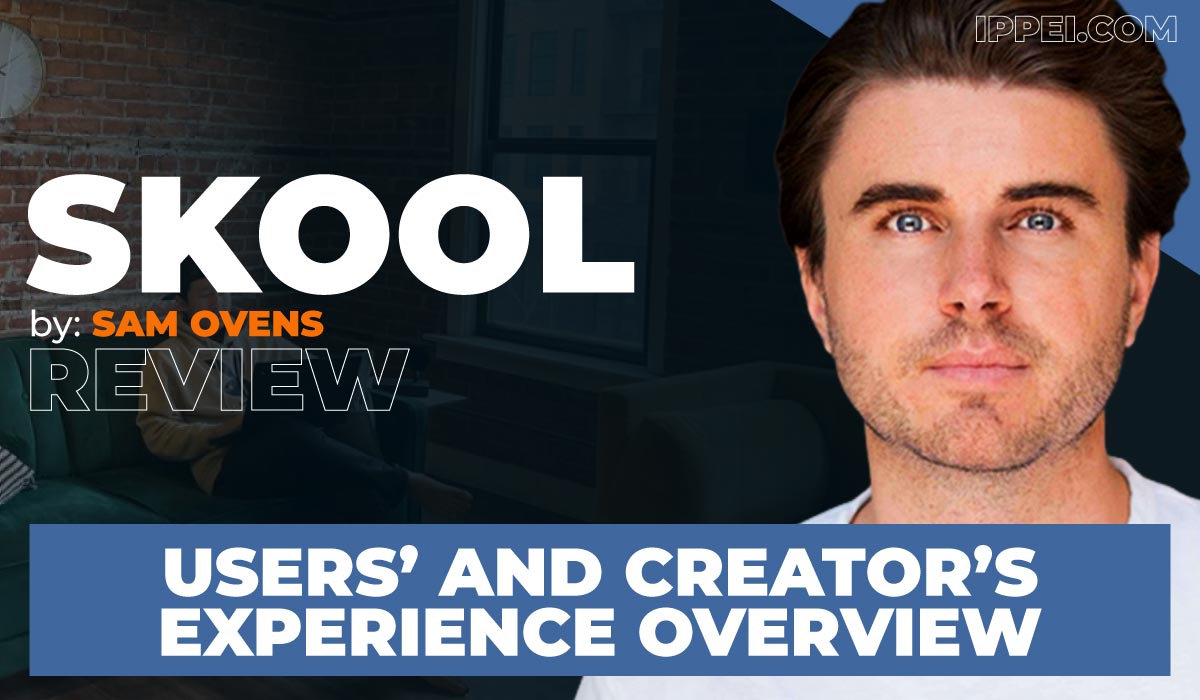
Skool is a community platform by Sam Ovens that enables you to join groups and earn income through your own paid memberships. It features a user-friendly dashboard for easy navigation. You can experiment with building your own community with a 14-day free trial, after which you can continue for a monthly fee of $99.00. Skool offers various tools for group management, including membership questions, Zapier integration, webhooks, and automated direct messaging for new members. A standout feature of Skool is its gamification element, which lets you customize your group with unique level names and rewards. This motivates your community members to engage more actively, contribute to discussions, take part in forums, vote in polls, and complete courses to advance to higher levels.
Skool has garnered positive reviews online. On Reddit, one community creator reported earning $100 per month from each member, highlighting the platform's potential for growing and selling courses or consulting services. On Quora, users praise Skool for its seamless user interface and valuable features. It particularly benefiting coaches and course creators.
This review of Skool provides an overview of the platform from both a user's and creator's overview, its pros and cons, and pricing information. We will also present a table comparing Skool to other community platforms in terms of features, functionality, user's experience, interface design, and pricing. Additionally, we will discuss three distinct features that Skool lacks. Finally, we will introduce a business model that requires minimal initial investment and offers the potential for recurring monthly income.
Skool Review: Pros And Cons
Pros
Skool allows you to join free communities with ease. I include free courses, discussion and even resources.
Skool offers you a 14-day trial to assess if it fits with your offerings.
Skool provides you an opportunity to earn recurring income by creating paid community.
Cons
Skool does not offer video hosting feature.
Skool has a limited tech support. The primary method of contacting support is via email. It might operate slower compared to platforms offering live chat support.
According to Great Software, Skool currently lacks built-in features for quizzes and file uploads (like PDFs). It can be essential for interactive learning and resource sharing.
Refund Policy
Skool doesn't have any refund policy. However, it offers a 14-day trial for you to experience and you may cancel it anytime.
Origin
Skool started in 2019 by Sam Ovens.
Reputation
The Skool community alone by Sam Ovens has already 43.8k members. Additionally, Thoughtlytics reveals that Skool hosts over 1000 communities today.
1. Skool Has a Straight Forward Dashboard
Skool offers a straightforward dashboard for you. You can freely discover tons of communities available on the platform. Additionally, the dashboard already offers basic information about the communities like if its public or private, community size and if it's free or paid. In the upper right corner, you can access your messages, notification and your profile setting. When you click the dropdown in the left corner of the dashboard, you will see a search bar, an option to create your community, discover communities, and a list of the communities that you've joined
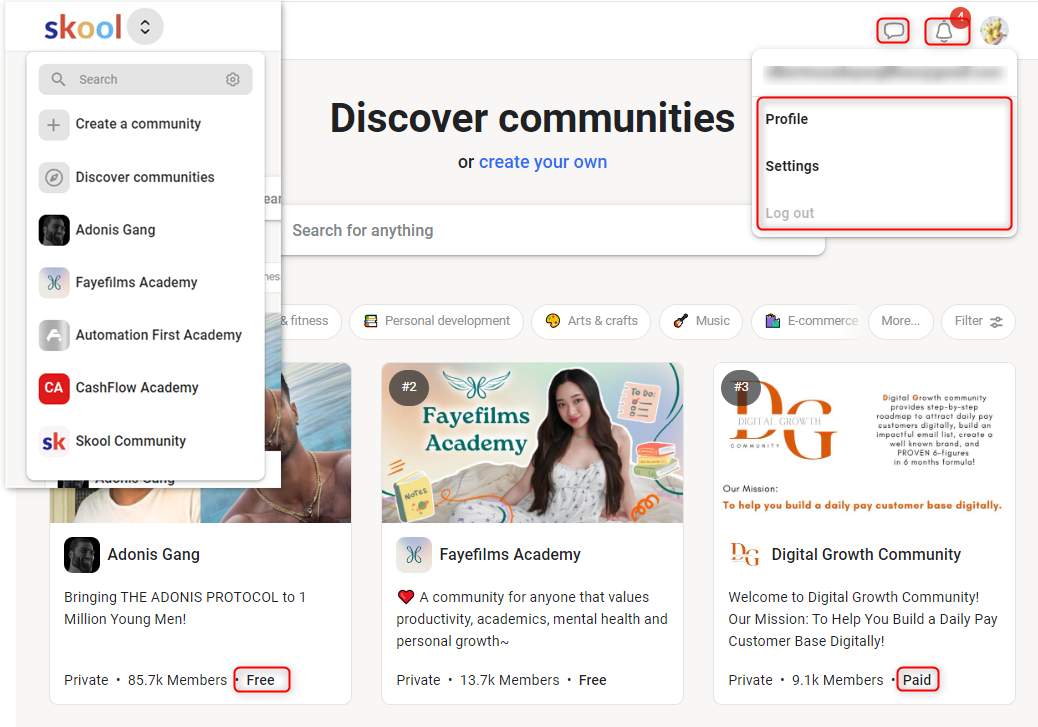
2. Skool Allows You To Filter Results
Skool enables you to filter your results when discovering communities. To give you an idea, Skool has a total of 19 categories and over a thousand communities. Ankur Tiwari from Thoughtlytics reports that Skool currently hosts approximately 1000 communities. These communities differ from Discord and Facebook groups, as they generate revenue through paid memberships. These features help you avoid feeling overwhelmed and narrow down your choices to target communities that align with your needs. If you are looking for a community that offers free and public access, you can simply select 'Public and Free.' Then, Skool will show you all the communities that are open to the public and allow free access.

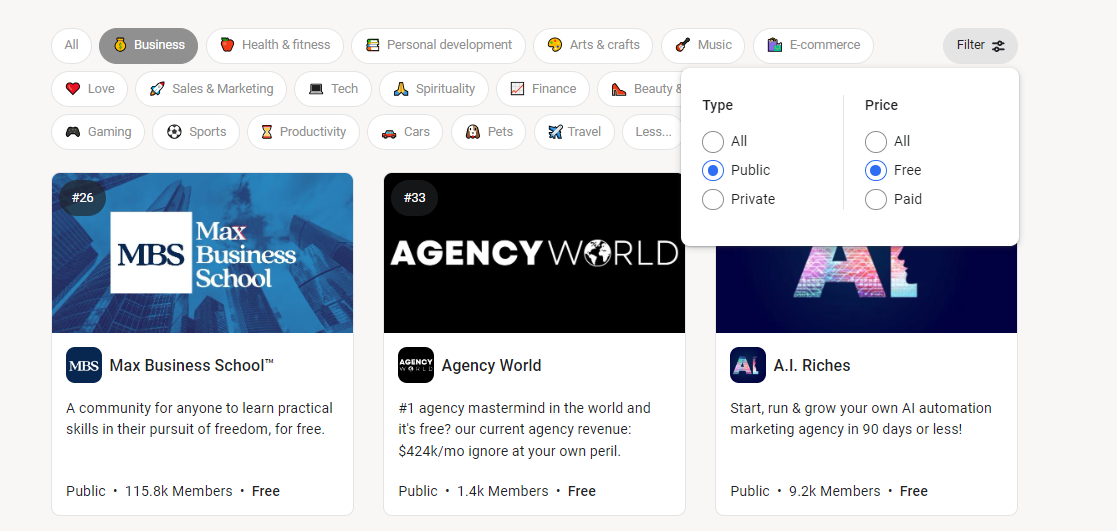
3. Skool Provides You Access To Free Programs
Skool provides you the opportunity to become a member and access free communities on their platform. After filtering out the results you can choose any communities. For example, click the top 5 community in Skool, which is A.I Power Accelerator. After that, the platform will direct you to the profile of the community. To join, just click the JOIN GROUP. Some of the free community ask some basic question such as your name and your email address. You can just click SUBMIT and your membership will become pending. The admin of the community will review your request.
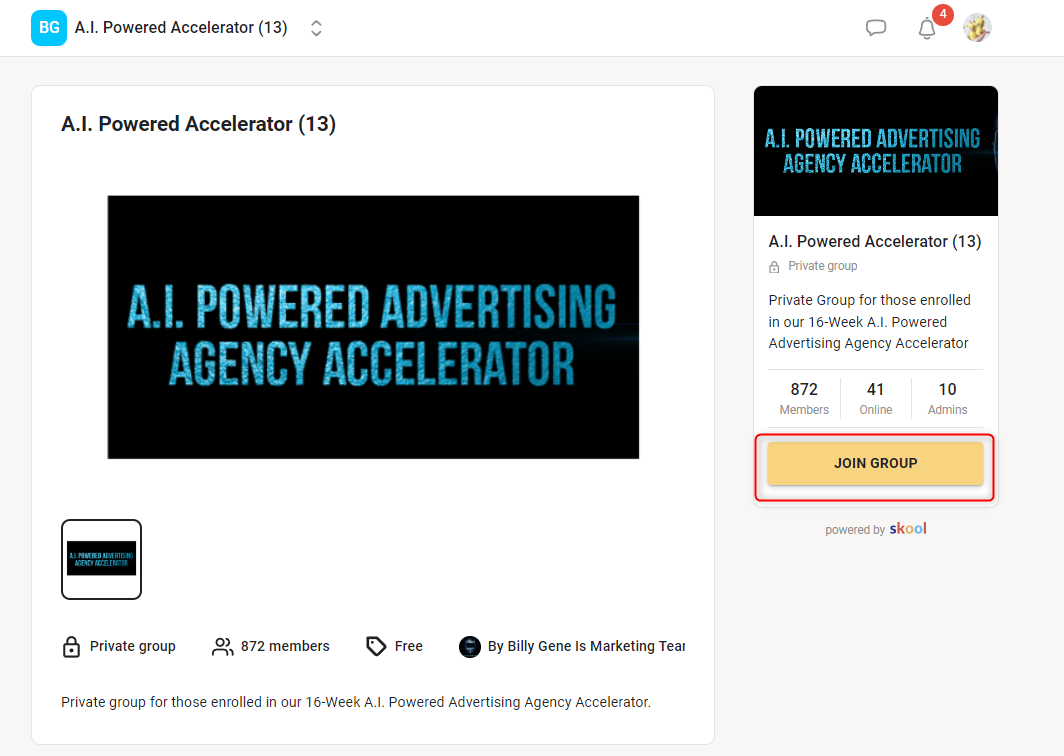
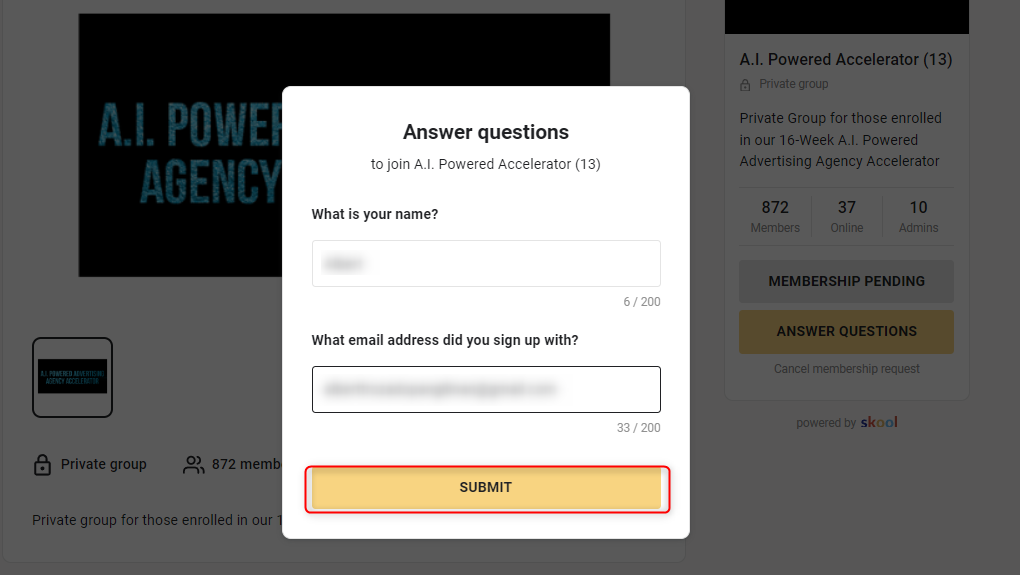
Once the admins approve your request, you can access the community fully. In the Community, you can see all the discussions between the creator and other members. You are free to write something to post in the community. You are allowed to add links, files, a YouTube, Vimeo, Loom, or Wistia link, create a poll, select a category of the community, and then hit Post.
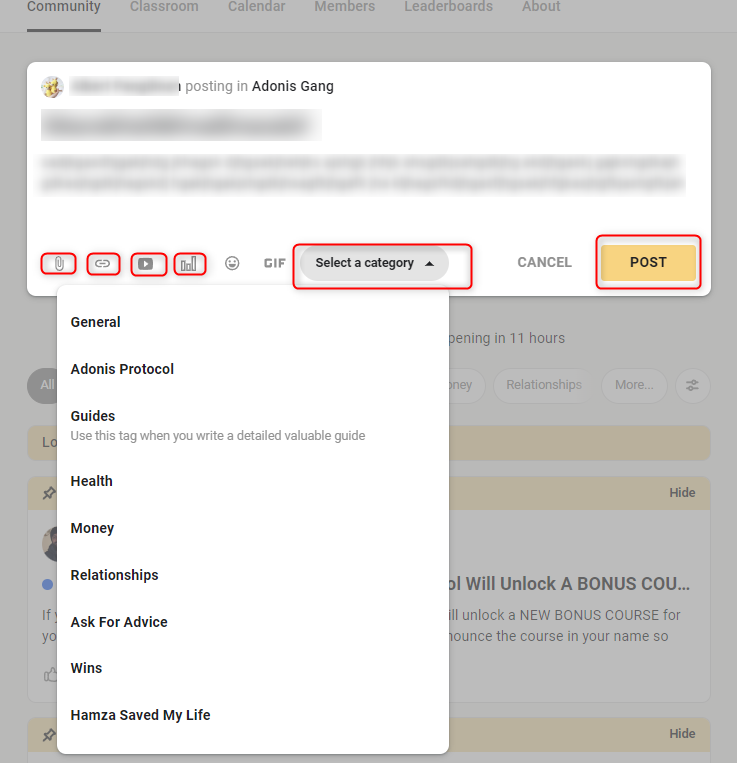
4. Skool Lets You Engage In The Discussions
Engaging in the community discussion is open to everyone. You can browse different discussions depending on your desired category. For example, in the Adonis Gang community, you can select the 'Ask For Advice' category. You may like the posts you want, but ultimately, you can share your advice with your co-members by providing comments. You can also take part in polls from the members of the community.
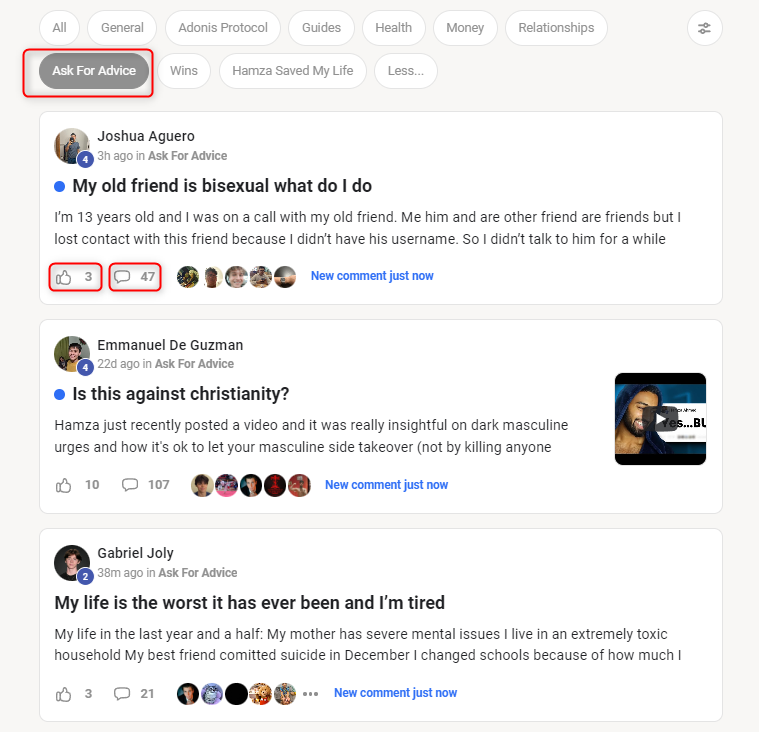
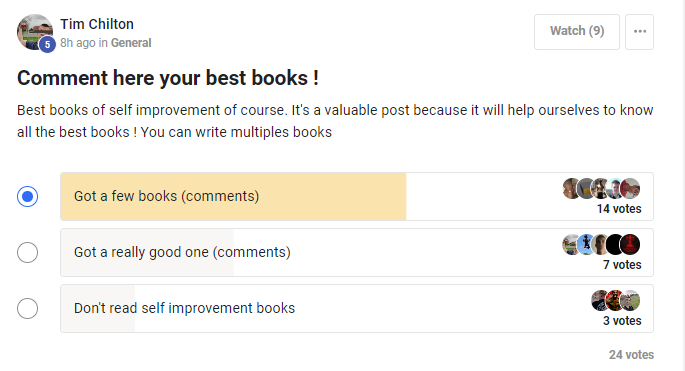
5. Skool Gives You Access To Community Features
In the Classroom section, you can find some free courses from the creator. Just simply click 'Open' and start watching the videos from the creator. You can also monitor your progress in the course. You're not just in a community, but also, Skool provides you with the chance to learn for free.
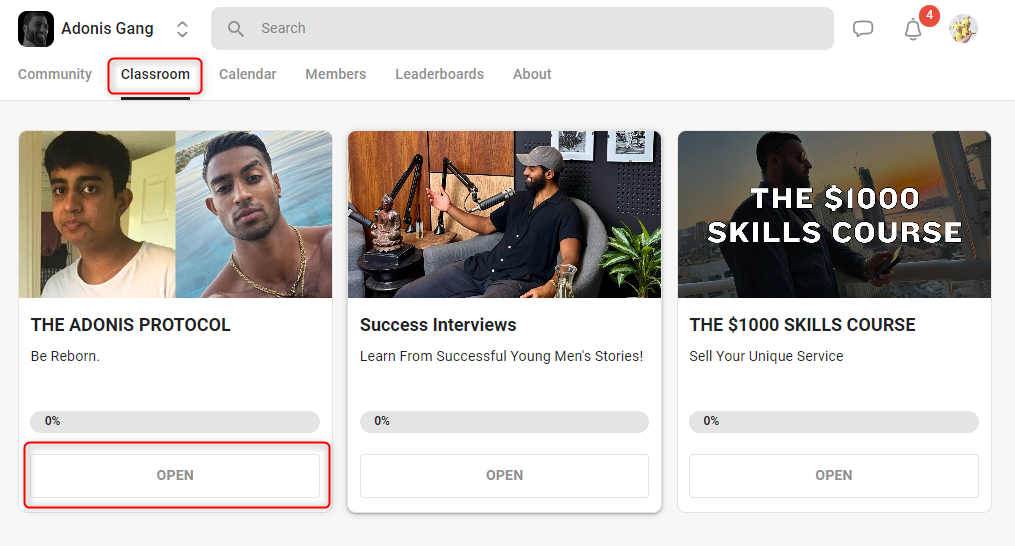

However, not all courses in the classroom are free. Some resources in the classroom will require you to subscribe to the creator's paid course or membership.

The Calendar section of Skool allows you to view upcoming events, workshops, and important dates related to the community. This feature keeps you organized and informed about scheduled activities, such as live sessions, deadlines for assignments, group discussions, or special events hosted by the community creators. You can typically click on each event for detailed information and set reminders or add events to their personal calendars.

In the Leaderboards section of Skool, the members ranks based on their participation and contributions to the community. This ranking is typically determined by specific metrics, such as the number of posts made, comments contributed, and reactions received. For instance, a member who frequently engages in discussions, offers helpful advice, or actively takes part in community challenges may find themselves higher on the leaderboard. This feature not only fosters a sense of competition and achievement, but also highlights active and influential members. It encourages others to increase their engagement.

6. Skool Provides an Option To Create Your Own Community
Skool's you an option to create your own community and manage a focused group centered on specific interests or educational themes. This feature empowers you to customize your community space, set rules, moderate discussions, and manage memberships. It's particularly useful for educators, experts, or enthusiasts who wish to share knowledge and build collaborative learning. Additionally, Skool enables community creators to monetize their efforts by offering paid memberships that providing a potential income stream.

Skool Features In Creator's Experience
1. Skool Has Low Barrier To Entry
Skool offers low barriers to entry for creating your own community. To get started, all you need to do is pick a catchy group name, which you can change later once you've set up your community. You'll also need a card number to begin your free 14-day trial. If you decide to continue afterwards, it will cost $99 per month. After clicking 'Start Free Trial', the system will direct you to your own dashboard.
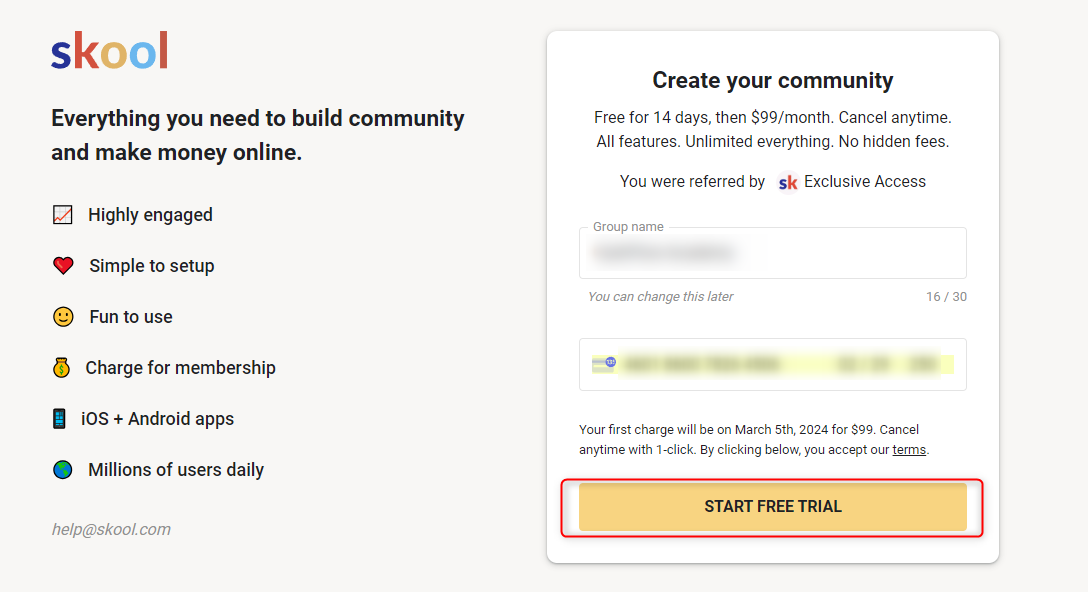
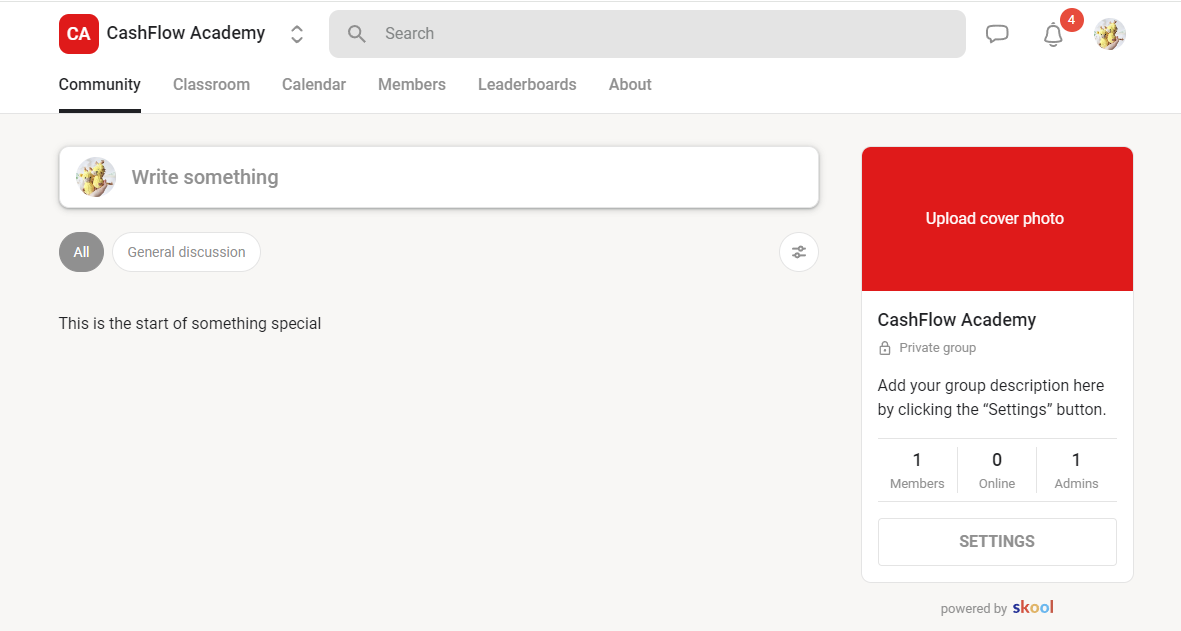
2. Skoll Offers Customization Options
Skool's platform allows for extensive customization option for you to create a unique and tailored group experience. You can personalize your group with a distinctive icon and cover image. It establishes a visual identity that resonates with your group's theme or brand. Additionally, the platform enables you to write a detailed group description. It provides an opportunity for you to outline your group's objectives, ethos, and what members can expect. It helps in attracting your right audience.
Moreover, Skool offers flexible subscription options. It allows you to choose the most suitable model for your community, ranging from free access to recurring payment plans. This feature is useful for groups offering exclusive content or services. The platform also supports the creation of various categories within a group. It facilitates better organization and easier navigation for your members. You can customize categories based on topics, activities, or post types. It improves the user's experience by making it easy for your members to interact with content that they are interested in.



3. Skool Uses Gamification Features
Skool's Gamification refers to integrating game-like elements into the platform. It enhances user engagement and participation. This feature is pivotal in creating a dynamic and interactive environment within your communities. By incorporating aspects such as points, badges, leaderboards, and achievement tracking, Skool transforms the experience of community participation from a passive to an active and rewarding one. For instance, your members can earn points for activities like posting, commenting, or attending events. It is not only fosters greater involvement but also provides a sense of accomplishment. You can reward your members by allowing them to access courses where they reach higher level.
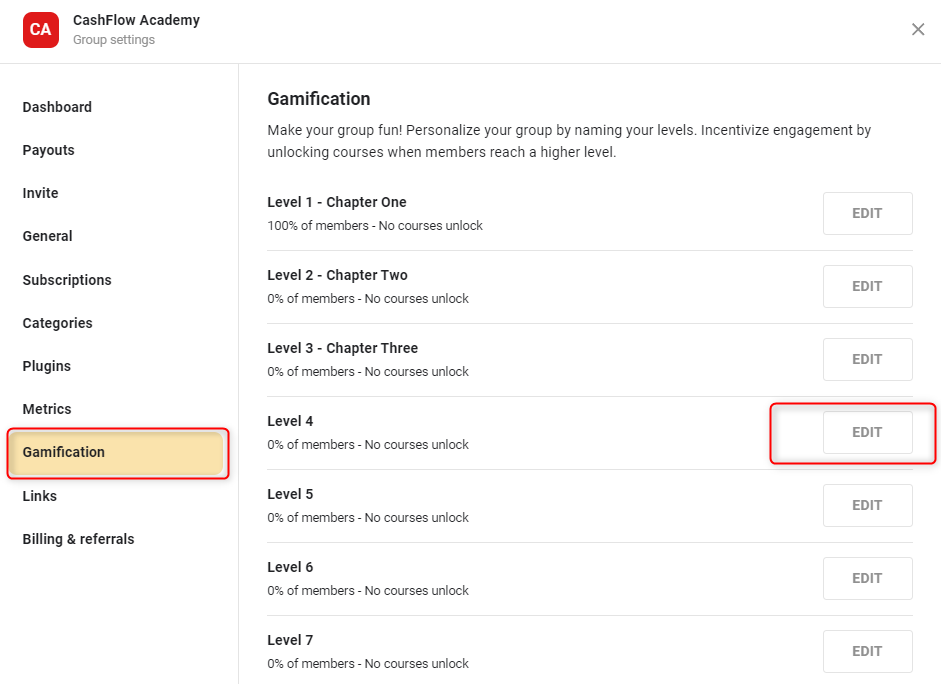
4. Skool Lets You Earn Through Referrals
Skool allows you to earn through referrals that offer a lucrative opportunity for you to generate income by encouraging others to join the platform. For instance, if you have a community on Skool and refer a friend who starts a group, you will receive a recurring commission for every month your friend's group is active. This feature not only incentivizes the growth and promotion of Skool but also transforms it into a potential income stream for you. It makes Skool an advantageous platform both for community building and for earning revenue through referrals.
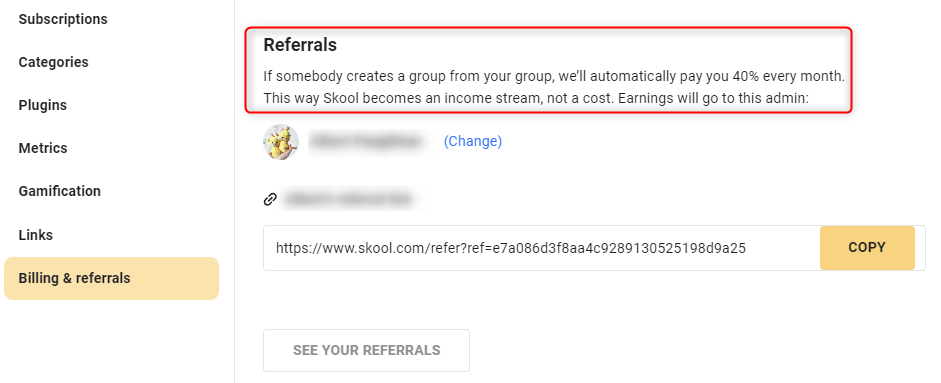
5. Skool Has Community Analytics
Skool's Metrics feature provides you an essential metrics to monitor and evaluate your online community's engagement over a 30-day period. It offers detailed graphs that display the total number of members, distinguishing between overall membership and active participants who regularly engage in the community through posts, comments, or discussions. Additionally, daily activity graphs are available. It highlights member interaction patterns, such as peak engagement times. This data is invaluable for you, as it helps understand your member's behavior, planning content or events, and strategizing ways to boost participation.
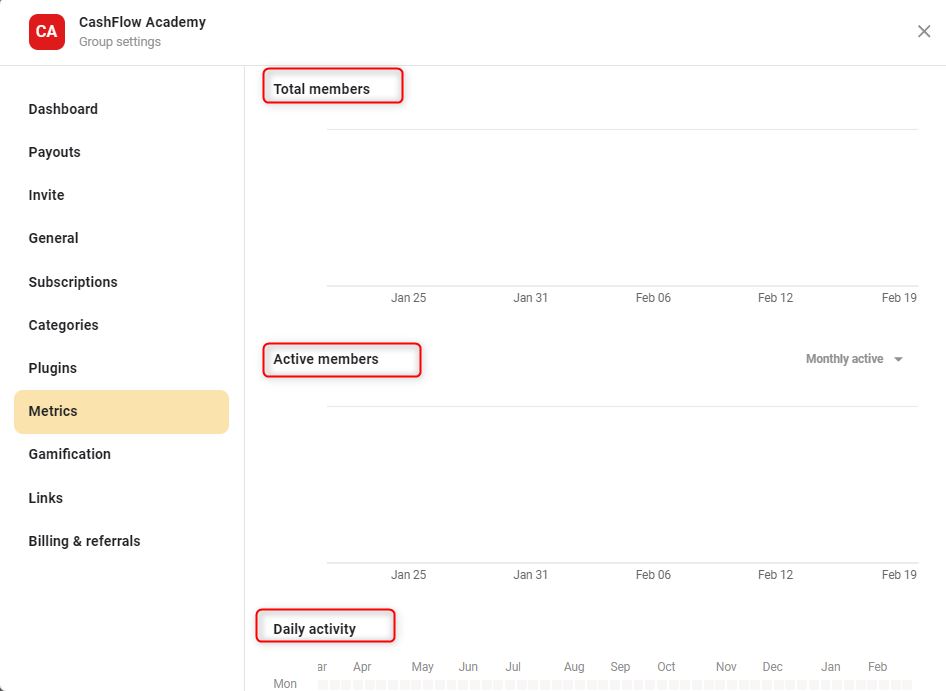
6. Skool Offers Useful Plugins
Skool offers four useful plugins to help you manage your community:

7. Skool Allows You To Link Your Resources
Skool allows you to integrate a variety of external platforms and resources directly into your community space. This includes linking social media accounts like Facebook and Instagram, which facilitate cross-platform engagement and visual content sharing. Additionally, you can connect your YouTube channel that provides seamless access to video content within the community. The ability to link other relevant resources such as blogs or websites further enriches your community experience.


What Is Skool?
Skool is an online platform designed for creating and managing online communities, courses, and coaching services. It enables you to build interactive communities where you can share knowledge and resources. Skool offers tools for creating and distributing online courses that makes it easier for you to reach your target audience. Moreover, it incorporates features for seamless communication and engagement, including forums, private messaging, and event scheduling. Currently, the top rank community in Skool is Adonis Gang by Hamza Ahmed. It is a free community that you can join anytime.
Some of highly ranked communities in Skool are:
What Is Skool App?

The Skool app is an educational platform by Sam Ovens to enhance your learning and collaboration within educational communities using your smartphone. It offers a range of features accessible to various devices,. It includes community group discussions, video and text-based courses, a calendar to track community events, and a chat function for direct messaging. With a 4.0-star rating on the Google Play Store and over 100,000 downloads, it provides a user-friendly experience with the added convenience of push notifications. It keeps you informed and engaged in your community while you're on the go.
What Is The Skool Pricing Details?
The Skool pricing details is $99 per month for each community. This single plan includes unlimited members, a community feature, and as many courses as you want to create. Additionally, it comes with a calendar feature for organizing events. If you want multiple groups, each will cost an additional $99 per month. Skool also provides a 14-day free trial that allows you to test the platform before committing financially.

Skool Features In User Experience
Creating Skool Account With Ease
Skool allows you to create and login your account with ease. Just go to skool.com and their website will direct you. You can see a clean website that features top communities. If you have an existing account, you can simply click the log-in button, input your email and password, and then hit the LOG IN button.

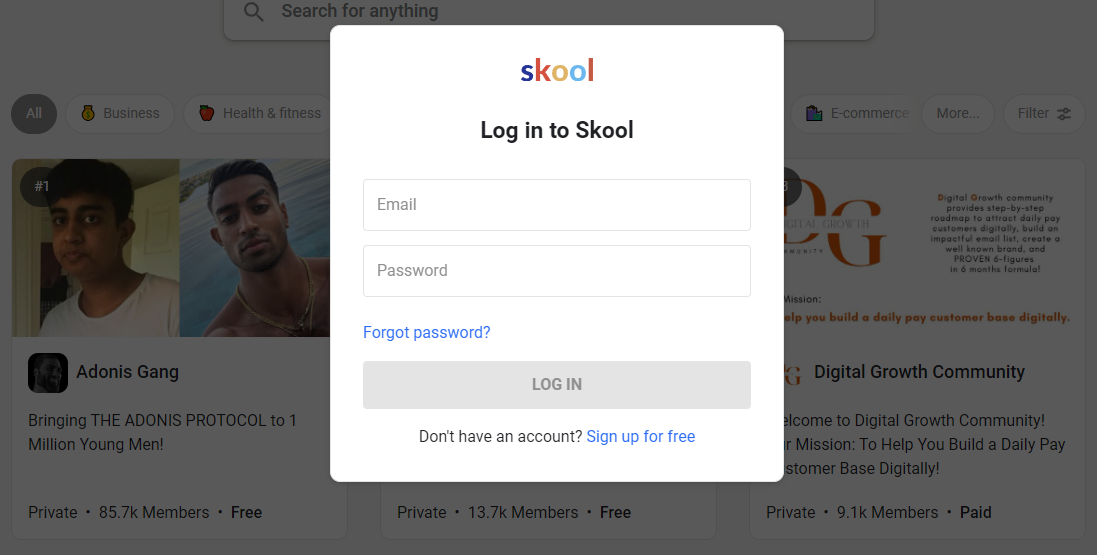
However, if you're new, Skool allows you to create your account for free. Just hit the sign-up button. Then you need to provide details about your first name, last name, email address and password. Once it's done, you are ready and hit the SIGN UP button.

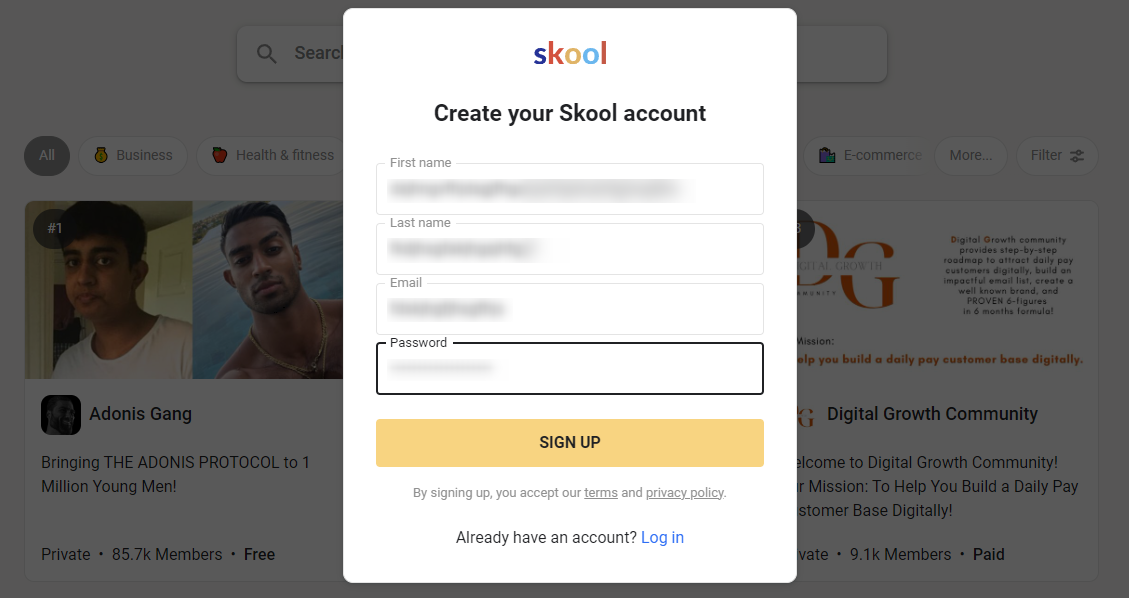
Skool Games 2024: Growing Your Business the Fun Way
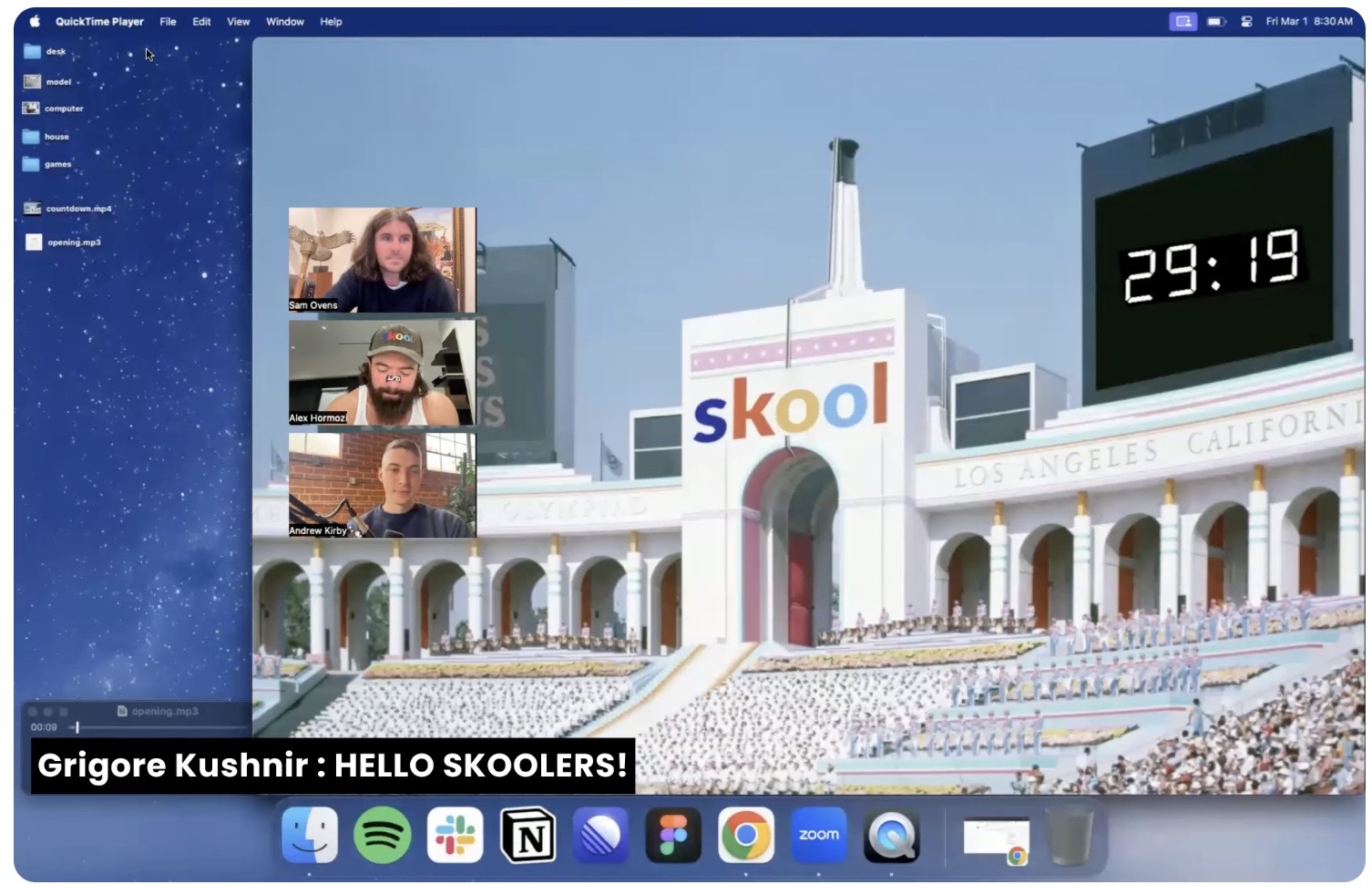
What is Skool Games by Sam Ovens?
Skool Games by Sam Ovens is a recurring monthly event that aims to grow and monetize digital communities. The Skool community invites participants to establish and nurture online communities with diverse interests and niches. This monthly event helps entrepreneurs grow their traffic and audience through healthy competition. In the Skool games, members come together to leverage their collective expertise and experiences to enhance the value of every individual and their online-based businesses.
The Goal of Skool Games
The main goal of Skool Games is to help people build online business communities. They provide the tools, training, and a helpful community to achieve this. The program also teaches participants how to earn money online and understand how online communities work as businesses.
What Do Skool Games Winners Get?
Winners of the Skool Games win a trip to Las Vegas, where they can meet the mentors and other entrepreneurs and personally share their strategies. On top of that, they also get recognized and gain more visibility on the Skool platform.
Skool VS Other Community Platforms
FEATURES AND FUNCTIONALITY
USER EXPERIENCE AND INTERFACE DESIGN
PRICING DETAILS
Skool VS Patreon
Patreon is designed for content creators to offer exclusive content and experiences to their subscribers, known as "patrons". Some of its features include tiered membership levels, direct communication tools, post scheduling, and analytics. You can share various types of content, such as videos, blog posts, images, and podcasts.
The platform has a straightforward and intuitive interface. It's easy for creators to set up their page and for patrons to navigate and subscribe. The design is clean and modern, focusing on showcasing creator content.
Patreon charges a percentage of the monthly income earned on the platform, which varies depending on the plan chosen. There are three plans: Lite (5% fee), Pro (8% fee), and Premium (12% fee), each offering different levels of features and support.
Skool VS Teachable
Teachable is an online course platform that allows individuals or businesses to create and sell courses. Key features include course creation tools, quizzes and certificates, integrated payment processing, and student management.
The platform offers a user-friendly course builder with customizable templates. It is designed to be accessible for instructors with varying levels of technical expertise.
Teachable offers several pricing tiers: Basic ($29/month), Pro ($99/month), Pro+ (159) and Business ($249/month). Each tier offers more advanced features, with the Pro plan being the most popular
Skool VS Discord
Discord is originally for gamers. It has become popular for various community types like local hiking clubs, to art communities, to study group and courses members. Some of its features include voice, video, and text chat, server customization, bot integrations, and screen sharing.
Discord has a modern, sleek design with a focus on chat functionality. It's highly customizable and can handle large communities effectively.
Discord is free to use, but it offers a premium subscription called Nitro for $9.99/month or $99.99/year, which includes enhanced features like better video quality, server boosts, and larger upload limits.
Skool VS Kajabi
Kajabi is an all-in-one platform and an Irvine, California-based SaaS technology company for online courses, memberships, and digital products. Features include website hosting, email marketing tools, a course builder, and a payment gateway.
The platform offers a professional and clean interface, with an emphasis on marketing and sales tools. It is suitable for non-technical users.
Kajabi offers three pricing plans: Basic ($149/month), Growth ($199/month), and Pro ($399/month). These plans vary in the number of products, marketing emails, and active members you support.
Skool VS Circle
Circle is a platform focused on building engaged communities for course creator. It offers features like customizable spaces, integrations with tools like Zapier and Memberful, live streaming, and event hosting.
Circle provides a clean and modern interface that's customizable to match brand aesthetics. It focuses on creating a seamless community experience.
Circle offers three pricing plans: Professional ($99/month), Business ($219/month), and Enterprise ($399/month). The plans differ in the number of members and community spaces offered, along with additional features like API access and priority support.
Skool Review Online
Skool On Reddit
Reddit user Limited-Red has started a new community in Skool that costs $100 per month. His community is booming, especially with the involvement of prominent entrepreneurs. Limited-Red mention that the Skool is likening it to the rise of Facebook in 2006. He is confident in the significant opportunity that Skool offers for business owners and entrepreneurs to develop and enhance their brands easily.


Skool On Qoura
Quora user Mila Jefferis commends Skool for coaches and online course creators. She cites its user-friendly design and gamified features that enhance user engagement. She appreciates the platform's intuitive interface, with tools like single sign-on and leaderboards that make the community management easier. Mila also highlights Skool's premium memberships feature for better content monetization. However, she notes that Skool might not be as suitable for businesses dealing with physical products. You need to assess your specific needs and read reviews before deciding to join Skool.
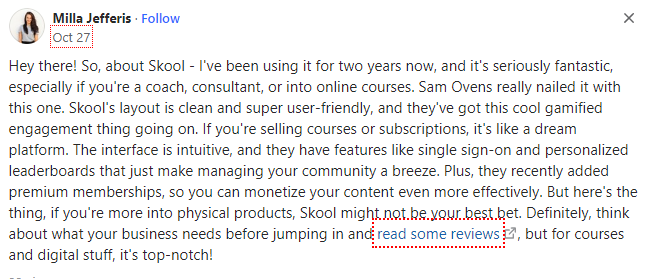
Who Is Skool For?
Skool is for online educators, coaching professionals, and community creators. It's an ideal platform for teachers and trainers who create and sell digital courses. It provides a streamlined system for course hosting and student engagement. Additionally, life coaches, business mentors, and personal development experts can leverage Skool for organizing sessions, tracking client progress, and encouraging interactive discussions. Lastly, Skool is for those focused on building and nurturing online communities because it offers robust features for community engagement and management.
3 Indistinct Features That Skool Lacks
1. Skool Has No OneTime Payments Feature
Skool's lack of a onetime payment feature presents a notable limitation, especially considering the market preferences. According to YouGov, the subscription model is less favored in advanced markets, with only 16% favorability in the United States, 20% in Great Britain, and 18% in Germany. These statistics highlight a significant preference for onetime payments over subscriptions, mainly because of avoiding recurring monthly expenses. Skool's subscription-only approach is beneficial for predictable monthly income for you, but it may scare potential members who prefer the financial simplicity and long-term economy of onetime payments.
2. Skool Doesn’t Provide Video Hosting
Skool's platform lacks an in-built video hosting feature that leads creators to rely on external services like YouTube, Vimeo, Loom, or Wistia to integrate video content into their courses or communities. This limitation adds complexity to the course creation process, as creators must upload their videos to a third-party service and then link them back to Skool. Additionally, it diminishes control over the content. It potentially exposes videos to issues like unwanted advertisements and varying playback quality.
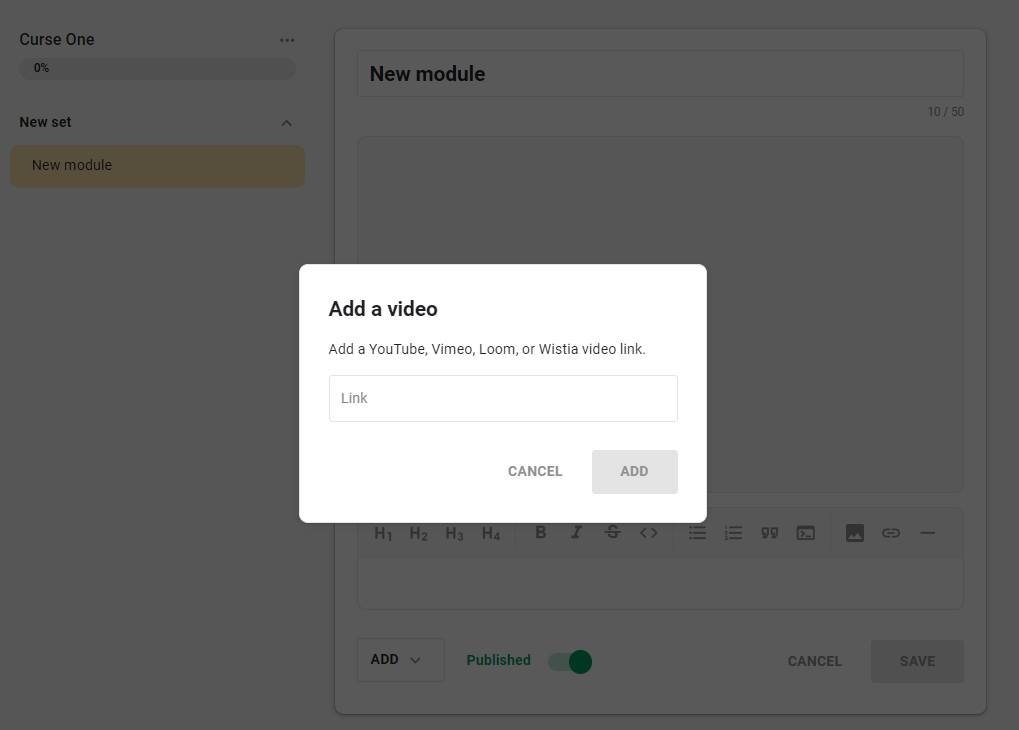
3. Skool Doesn't Include A Funnel Builder
Skool doesn't have its own tool for making sales funnels. This is a big downside for users who want to sell their courses or build online communities. Without this tool in Skool, you have to use other programs like ClickFunnels or Leadpages. For example, if you made a cooking course on Skool, you would need to use a different program to set up a webpage that gets people interested, collects their emails, and then encourages them to buy your course. This extra step can make things more complicated and might not work as smoothly with your Skool course. It's like having to use two different tools for one job, which can be a hassle.
Is Skool Worth It?
Skool is worth it for course creators because it helps your students or community members get more involved. It has discussions, polls, and places for your students to talk to each other and make learning fun and interactive. Plus, with useful analytics features about how your community is doing, you can keep improving your courses. And at $99 a month, Skool offers a lot of helpful features without being too expensive. It's a good choice for those wanting to build a strong online learning community.
Take Dan Henry's example. He's a YouTuber who's nailing it on Skool. By offering a paid community membership, he's making a whopping $100,000 a month. His community, Get Clients University, got about 1,200 members that each paying $97 monthly. Dan uses Skool's gamification, regular events, and smart marketing strategies to keep his members engaged and even upsell them.
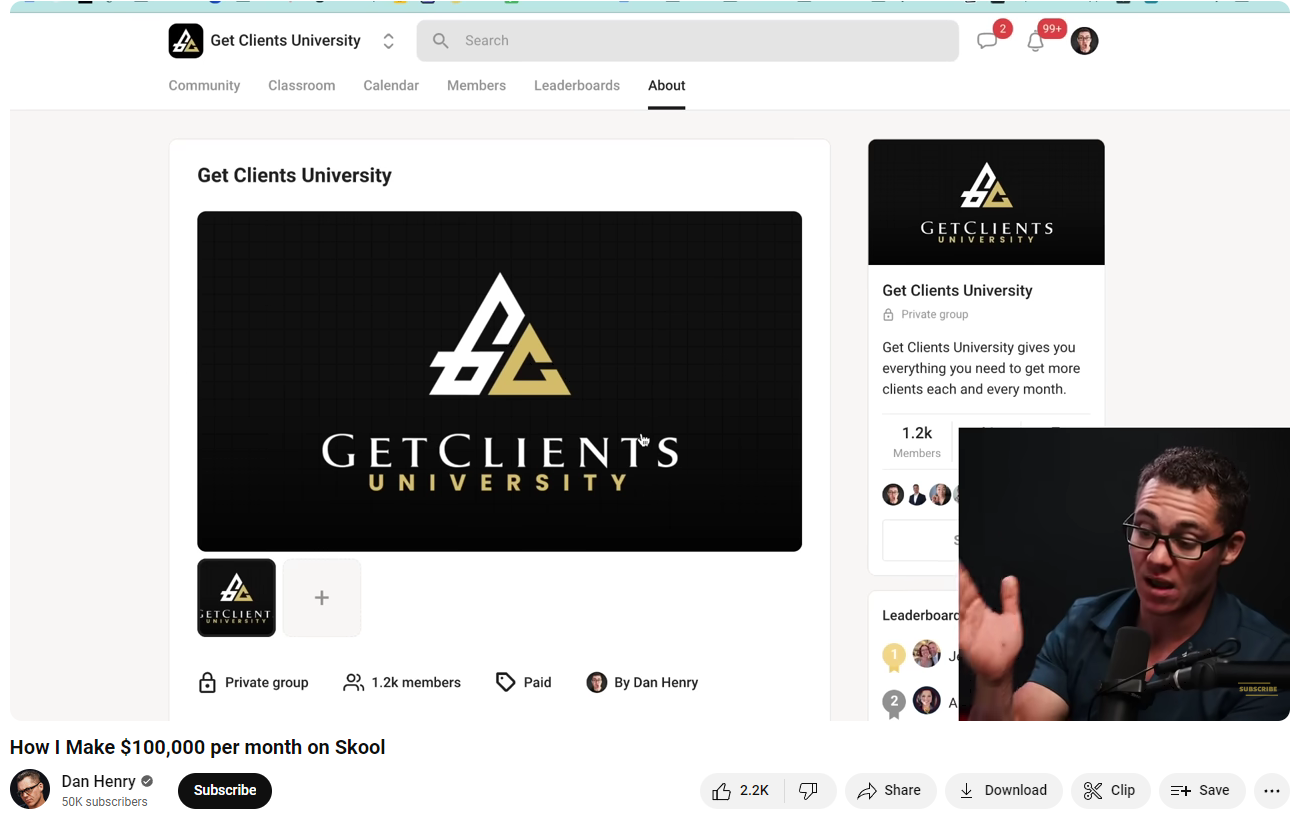
Then there's Ted Carr. He's another big success on Skool, pulling in $50,000 a month. Ted's strategy is all about creating content that people love, spreading it across social media platforms like TikTok, LinkedIn, YouTube, Instagram, and Facebook. This content draws people into his low-ticket subscription funnel.

Who Is Sam Ovens?

Sam Ovens is a successful entrepreneur from New Zealand and best known for his expertise in business consulting and digital marketing. He was born on August 10, 1989, in Auckland, New Zealand. Ovens founded Consulting.com and SnapInspect that contribute to his estimated net worth of around $10 million as of 2024, as per Commission Academy. According to them, he invested in real estate and owns luxury cars like a Bentley Mulsanne and a Range Rover Autobiography. Sam sold his e-learning business to focus on Skool.
Sam Ovens has really a strong online presence. He boasts 162K subscribers on YouTube, 99.8K followers on Instagram, over 2,000 followers on LinkedIn, and his own community has 43.8K members.
What Is Consulting.com By Sam Ovens?
Consulting.com by Sam Ovens is an online learning platform. Its intention is to provide guidance for entrepreneurs to become successful consultants. This platform offers specialized training programs like Wetube and Quantum for coaches, course creators, and agency owners, helping them increase their income and achieve professional freedom. Sam Ovens sold Consulting.com to Rian Doris to focus on developing Skool.
Conclusion: Create Recurring Income Stream With Local Lead Gen Biz
Local lead generation biz enables you to create a recurring income stream, similar to establishing a paid membership on Skool. However, local lead gen offers minimal investment, less competition, and a high income potential. Instead of creating a paid membership on Skool for a predictable monthly income, you create lead generation websites as digital assets for as low as $500. You then use SEO to rank these sites high on Google. Once ranked, you can rent them out to local businesses needing leads and earn a passive monthly income ranging from $500 to $3,000. With Skool, maintaining your community involves active engagement such as answering questions, taking part in forums and discussions, and regularly updating your free resources to keep your community members. In contrast, once your lead gen website generates leads, it requires minimal ongoing effort. You can set it and forget it and still earn monthly income from your happy clients.
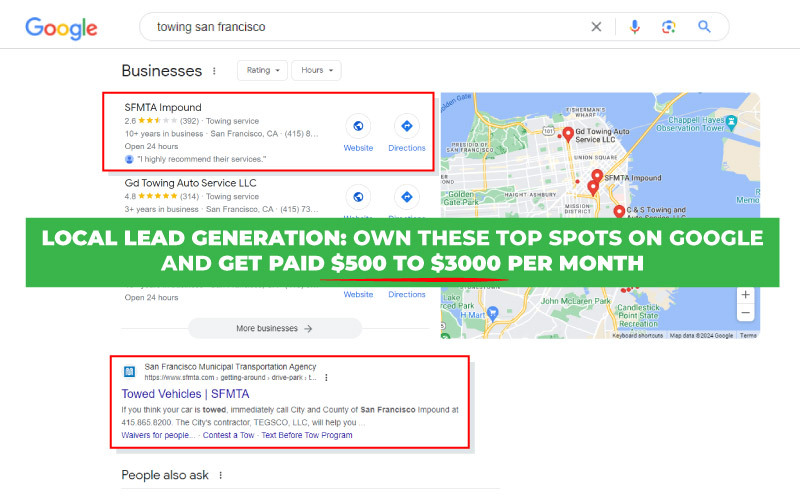
In terms of competition, local lead gen businesses is a champion. According to Thouthlyitcs, Skool already hosts over 1,000 communities that demand you a significant effort in your offerings, events, and membership pricing to stand out. Local lead gen, however, means competing with just 10-15 local companies, significantly less than on Skool. Additionally, lead gen biz has potential for high profit margins that ranges from whooping 80% to 95%.
Local lead generation also allows for scalability. You can create lead gen websites as many as you want. Join my local lead gen coaching program to learn how to start a passive and low-risk income source.



